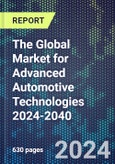The market for advanced automotive technologies is experiencing rapid growth as vehicles become more connected, electrified, autonomous and smart. Favourable regulatory environments coupled with changing consumer preferences and mobility models are accelerating the adoption of these converging technologies on a global scale. Market growth will be driven by rising EV sales, higher adoption of ADAS and autonomous driving sensors, increasing connectivity uptake for V2X and software-defined vehicles, and advancements in in-cabin interfaces.
The Global Market for Advanced Automotive Technologies 2024-2040 provides a detailed analysis of the latest trends and technologies shaping the future of the automotive market. It assesses advanced automotive technologies spanning self-driving vehicles, vehicle connectivity, electrified powertrains, emerging battery tech, in-cabin monitoring, and associated components.
The report thoroughly evaluates the rationale, evolution, current state and future outlook for autonomous driving, assessing automation levels, sensors, perception systems, testing protocols, commercial deployment, OEM and supplier company strategies, and market forecasts. It analyzes the hardware requirements, sensor portfolios, lidars, radars, cameras, sensor fusion, localization, mapping, artificial intelligence, compute platforms, safety, cybersecurity, and testing involved in developing vehicle autonomy.
Global market forecasts are provided for self-driving vehicle unit sales, autonomous driving sensors, radars, and key components from 2022-2040. Regional breakouts, SAE level segmentation, and technology level granularity provide unmatched market insights. Vehicle connectivity and software-defined vehicles are analyzed in detail, covering vehicle-to-everything (V2X) communication, 5G integration, mobility as a service impacts, over-the-air updates, domain controllers, new app capabilities, data analytics, hardware requirements, and market outlook.
Global market forecasts are segmented by software-defined vehicle level and connectivity sub-system from 2022-2040. Powertrain electrification is assessed in depth, analyzing EV types, battery technologies, charging solutions, recycling, key components suppliers, and market trends. Technology evolution, chemistries, cell formats, packs, battery management, thermal interface materials, cooling systems are examined for EV batteries. Market forecasts cover EV sales, components, powertrains, battery demand from 2022-2040.
Emerging beyond lithium-ion battery technologies are evaluated including solid state, Li-sulfur, Na-ion, Al-air, recycling methods, and supply chain sustainability. The transition towards a circular battery economy and closed loop value chain is assessed in detail. In-cabin monitoring systems are thoroughly analyzed covering driver monitoring systems, occupant tracking, attention alerts, behavioural monitoring, regulation, biometrics, transparent displays, holography, flexible interfaces, AR evolution, voice assistants, companies, and market revenue forecasts to 2040.
In total, the report includes over 140 tables detailing market and technology data as well as over 100 figures illustrating key insights. Complete listings of all abbreviations and acronyms used in the report are provided. The report will help technology vendors, automakers, researchers, and government agencies understand the latest developments in these converging automotive disciplines as the industry transitions towards smart, connected, electric, and autonomous mobility.
The Global Market for Advanced Automotive Technologies 2024-2040 profiles over 800 companies. Companies profiled in the report include ABB, Actronika, Adaps Photonics, Advanchip, AEye, AMS Osram, Arbe Robotics Ltd, Aspinity, Baidu, Bosch, Continental, Echodyne, Grayscale AI, Haike Electronics, Hikvision, Huawei, iGentAI Computing Technology, Infineon, Joyson Safety Systems, Kneron, Kognic, Lumotive, Lunewave Inc., LG Innotek, Magna, Metawave, Mojo Vision, NODAR, NXP Semiconductors, Omnitron Sensors, OmniVision, Plastic Omnium, Prophesee, RoboSense, SenseTime, SiLC Technologies, Spartan Radar, STMicroelectronics, Stellantis, Svolt, Tacterion, Terabee, Tesla, Texas Instruments, Toyota, Ultraleap, Uhnder, Valeo, Vayyar, Visteon, Volkswagen, Volvo, Vueron, Waymo, Zadar Labs, and Zendar.
Table of Contents
1 RESEARCH METHODOLOGY
Companies Mentioned (Partial List)
A selection of companies mentioned in this report includes, but is not limited to:
- ABB
- Actronika
- Adaps Photonics
- Advanchip
- AEye
- AMS Osram
- Arbe Robotics Ltd
- Aspinity
- Baidu
- Bosch
- Continental
- Echodyne
- Grayscale AI
- Haike Electronics
- Hikvision
- Huawei
- iGentAI Computing Technology
- Infineon
- Joyson Safety Systems
- Kneron
- Kognic
- Lumotive
- Lunewave Inc.
- LG Innotek
- Magna
- Metawave
- Mojo Vision
- NODAR
- NXP Semiconductors
- Omnitron Sensors
- OmniVision
- Plastic Omnium
- Prophesee
- RoboSense
- SenseTime
- SiLC Technologies
- Spartan Radar
- STMicroelectronics
- Stellantis
- Svolt
- Tacterion
- Terabee
- Tesla
- Texas Instruments
- Toyota
- Ultraleap
- Uhnder
- Valeo
- Vayyar
- Visteon
- Volkswagen
- Volvo
- Vueron
- Waymo
- Zadar Labs
- Zendar
Methodology

LOADING...








